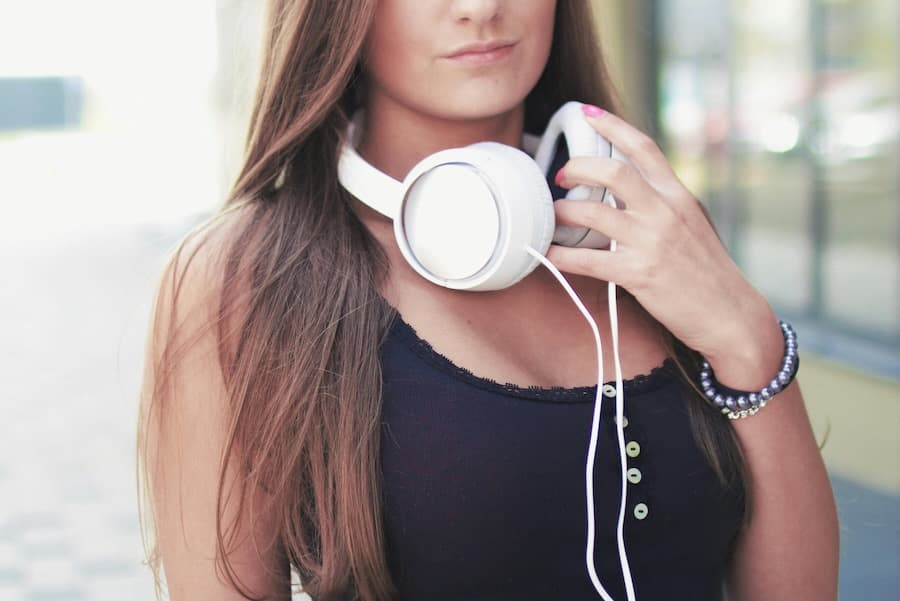October 16, 2024
Noise-Canceling Headphones
Article Navigation: Quick Access to Sections
Noise-canceling headphones are often marketed as a solution for creating quiet environments, ideal for travel, focus, or relaxation. But can they actually help people manage Tinnitus? In this article, we explore how noise-canceling technology works, whether it can alleviate the perception of tinnitus, and the pros and cons of using ANC headphones for tinnitus relief.
The Role of Noise-Canceling Headphones in Tinnitus Management
For people living with tinnitus, finding effective ways to manage the persistent ringing, buzzing, or hissing in their ears can feel like an ongoing quest. Noise-canceling headphones are frequently suggested or considered as a potential tool. They are designed primarily to reduce unwanted background noise, but does this function translate into help for the internal sounds of tinnitus? While these headphones excel at creating a quieter external environment, their effectiveness specifically for managing tinnitus itself is complex and varies significantly from person to person.
What Are Noise-Canceling Headphones?
Noise-canceling headphones primarily utilize active noise control (ANC) technology. Microphones on the outside of the headphones detect ambient sounds, and internal circuitry generates an opposing sound wave (anti-phase) that effectively cancels out the incoming external noise before it reaches the wearer's ears. This technology is particularly effective against constant, low-to-mid frequency background noise, such as airplane engine hum, train sounds, air conditioning noise, or steady city traffic. But how does creating this artificial quiet affect someone experiencing internal tinnitus sounds?

Can Noise-Canceling Headphones Help Tinnitus Sufferers?
The answer is nuanced: sometimes, but not always, and not directly. Tinnitus perception can often be exacerbated by noisy environments, where the cacophony of external sounds competes or mixes unpleasantly with the internal ringing or buzzing. By effectively reducing or eliminating these external noises, noise-canceling headphones can certainly help create a more peaceful and less overwhelming auditory environment. This reduction in external noise 'clutter' can make it easier to focus, relax, or concentrate, indirectly lessening the stress associated with noisy situations.
How It Works (or Doesn't Work) for Some People
For some individuals with tinnitus, wearing noise-canceling headphones, especially in loud places, provides welcome relief by offering a controlled, quieter space. By reducing the overall auditory load, it might make their tinnitus feel less prominent relative to the now-absent background noise, or simply reduce the overall sensory overwhelm. This can be particularly helpful during travel, in open offices, or other situations where inescapable external noise makes tinnitus more bothersome.
However, the experience can be quite different for others. A common observation among tinnitus sufferers is that complete silence can actually make their tinnitus seem louder or more noticeable. This is because, in the absence of external sounds, the brain has less auditory input to focus on, allowing the internal tinnitus signals to become more prominent in perception. Therefore, using noise-canceling headphones in an already quiet environment might inadvertently increase tinnitus awareness and distress for some individuals.
In these cases, a more effective strategy is often to combine noise-canceling headphones with background sound therapy. Playing a low level of neutral, steady sound—like white noise, pink noise, or gentle nature sounds—through the headphones can provide a subtle external sound floor that helps mask or blend with the tinnitus, preventing the perceived intensification that silence can cause.
Additionally, it's worth noting that mainstream consumer devices are evolving. Apple's AirPods Pro 2, for example, incorporate features like Conversation Boost and background sound options that might offer some benefits similar to hearing aids or sound therapy devices for certain users. For more details, check out our article: AirPods and Tinnitus.
Pros and Cons of Noise-Canceling Headphones for Tinnitus
While noise-canceling headphones can be a useful tool, they are not a universal solution for tinnitus. Understanding their potential benefits and drawbacks is crucial:
Sound Environment Impact
| Pros | Cons |
|---|---|
| • Creates a quieter space, potentially aiding focus • Blocks distracting or irritating external noises • Reduces impact of background noise pollution • Very helpful in specific noisy environments (planes, trains, open offices) • Can be effectively used with sound therapy apps | • May make tinnitus more noticeable in already quiet settings • Some users report an unnatural "pressure" sensation in the ears from ANC • Some ANC models produce a faint low-frequency "hiss" themselves • May not block all types of noise effectively (e.g., sudden sharp sounds, speech) |
Stress & Anxiety Effects
| Pros | Cons |
|---|---|
| • Can reduce stress caused by constant environmental noise • May aid concentration by reducing distractions • Might indirectly improve sleep quality if used for relaxation before bed or during travel • Provides a sense of control over one's auditory environment • May reduce the fight-or-flight response triggered by overwhelming noise | • Can potentially increase anxiety if tinnitus becomes more prominent in the induced quiet • Some users report feeling isolated or disconnected from their surroundings • Risk of developing psychological dependency on wearing headphones • Might worsen social anxiety in some cases if used as avoidance |
Practical Usage Considerations
| Pros | Cons |
|---|---|
| • Highly portable and convenient for use in various locations • Can be used almost anywhere (travel, work, home) • Works seamlessly with sound therapy apps or music/podcasts • Many models offer long battery life • Versatile for use while working, commuting, or relaxing | • Can be an expensive investment • Requires regular battery charging • Some users find them uncomfortable for extended wear (especially over-ear models) • Can interfere with hearing important environmental sounds (alarms, announcements, traffic) • Not suitable for all activities (e.g., where situational awareness is paramount) |
Potential Health Impact
| Pros | Cons |
|---|---|
| • May reduce ear strain from constantly filtering loud environments • Can contribute to preventing further noise-induced hearing damage by allowing lower listening volumes • Useful tool for protecting hearing in known noisy situations • May offer relief for individuals with sound sensitivity (hyperacusis) | • Could potentially worsen tinnitus perception for some individuals, especially in quiet • Some users report ear pressure, fullness, or mild discomfort from ANC • Rarely, some users report headaches associated with ANC use • Could potentially affect balance perception momentarily for highly sensitive individuals • Effectiveness can vary depending on the type and cause of tinnitus |
Social Aspects
| Pros | Cons |
|---|---|
| • Can help maintain focus and reduce overwhelm in noisy social settings (e.g., cafes, large gatherings) • May reduce social anxiety triggered by loud environments • Useful for managing noise in crowded public transport or shared workspaces • Can aid concentration during collaborative work or virtual meetings | • Wearing headphones, especially over-ear models, may appear anti-social in some contexts • Can make direct face-to-face communication difficult or impossible • Risk of missing important parts of conversations or social cues • Might be perceived as rude or disengaged in certain social or professional situations • Can potentially create barriers to spontaneous social interaction |
Note: Individual experiences with ANC headphones and tinnitus vary significantly. What provides relief for one person might increase awareness for another. It's often necessary to experiment with different models, settings, and usage scenarios to determine what works best for your specific situation and type of tinnitus.
Using Noise-Canceling Headphones Effectively with Sound Therapy
For many tinnitus sufferers, the most effective approach often involves combining noise-canceling headphones with sound therapy. By pairing the external noise-blocking benefits of ANC headphones with a low level of soothing background sound played through the headphones, you can create a controlled and pleasant auditory environment. This helps mask the tinnitus without creating complete silence, which can make the ringing more prominent for some.
Consider playing sounds such as white noise, pink noise, brown noise, or nature-inspired soundscapes at a volume just loud enough to blend with or cover your tinnitus. We recommend visiting our Zen page to explore a variety of sound therapy options designed specifically for tinnitus relief that can be easily streamed through your headphones.

Practical Tips for Using Noise-Canceling Headphones with Tinnitus
If you're considering using noise-canceling headphones as part of your tinnitus management toolkit, here are some practical tips:
- Pair with Sound Therapy: As mentioned, often the best approach is to use low-level sound therapy (white noise, nature sounds) through the headphones simultaneously to avoid complete silence making tinnitus more noticeable.
- Experiment in Different Environments: Test the headphones in various settings (noisy commute, quiet office, home) to see where they provide the most benefit or if they worsen symptoms in certain conditions.
- Avoid Relying on Total Silence: For many tinnitus sufferers, inducing complete silence with ANC can make the internal sound more prominent. Adding soft background sounds is often key.
- Take Regular Breaks: Prolonged headphone use, even without loud music, can sometimes lead to ear fatigue or discomfort. Ensure you take breaks periodically to let your ears rest.
- Be Mindful of Volume: If playing music or other audio through the ANC headphones, remember that the noise cancellation allows you to listen comfortably at lower volumes. Avoid the temptation to crank up the volume unnecessarily.
- Consider Fit and Type: Over-ear ANC headphones generally provide better noise cancellation but can be bulkier. In-ear ANC earbuds are more portable but might feel different regarding ear pressure for some users. Try different types if possible.
The Future of Noise-Canceling Technology and Tinnitus Relief
As noise-canceling technology continues to evolve, its potential role in tinnitus management may expand. Companies like Bose and Apple (as seen with AirPods Pro) are increasingly integrating features resembling hearing aid functionalities into consumer audio products. This could include more sophisticated sound personalization, ambient sound passthrough modes, and perhaps even specific tinnitus sound therapy protocols built directly into headphones in the future.
While noise-canceling headphones are not a direct cure or treatment for the underlying cause of tinnitus, they represent a valuable tool for managing the condition in specific situations, particularly by reducing environmental noise stress and facilitating the use of sound therapy.
The Road Ahead for Tinnitus Sufferers Using Technology
For those living with tinnitus, finding relief often involves experimenting with various strategies to discover what works best individually. Noise-canceling headphones, especially when combined thoughtfully with sound therapy, can be a helpful component of a broader, holistic management strategy. By understanding how ANC technology interacts with your personal tinnitus experience and using it mindfully, you can potentially leverage these devices to gain more control over your auditory environment and find greater peace amid the noise.